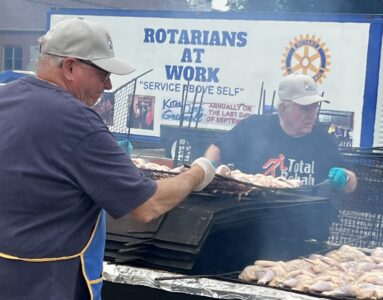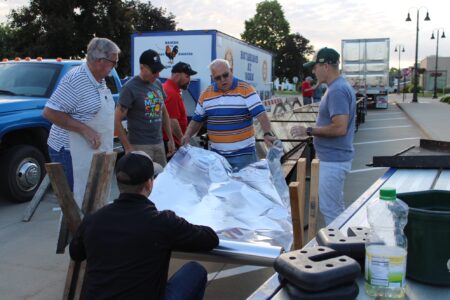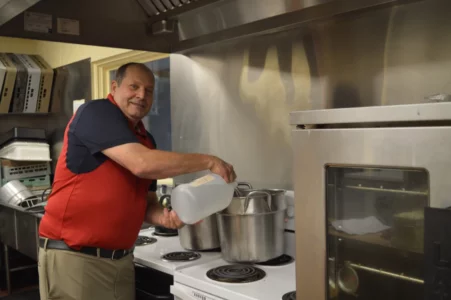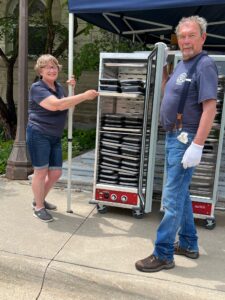GRINNELL, Iowa (June 2, 2024) – All is ready for the 70th anniversary of Rotary Club’s chicken barbecue fundraiser to be held this Thurs., June 6th.
The traditional meal of one-half charcoal-grilled chicken, potato chips, pudding, and bottled water can be picked up for lunch from 11:30 a.m. to 1:00 p.m. and for dinner from 3:00 to 6:30 p.m. in front of the United Methodist Church on Park St. across from the Drake Public Library.
Cost has remained at $12. Tickets can be purchased ahead of time from any Rotarian, Medicap, Brown’s Shoe Fit, Total Choice, and Grinnell State Bank. Tickets will be available on the day itself.

Frank Shults, coordinator of this year’s chicken barbecue and incoming president of Grinnell Rotary, feels particularly honored to be
coordinating this long-time Rotary tradition on its 70th anniversary. Referring to the chicken barbecue as the “kick-off” to summer in Grinnell because it is held on the first Thursday in June after K-12 school gets out, Shults, who joined Rotary in 1989, said that the way Rotarians have conducted this event has changed through the years.
INNOVATIONS THROUGH THE YEARS
Allen Latcham, member since 1970, has been central to these changes. He said that in the beginning, Rotarians built the barbecue pit every year with 500 to 600 cement blocks. They’d lay them out on the grass in Central Park, spreading vermiculite at the bottom of the pit to keep the heat in. “It was a chore,” Latcham said. “At the end of the day, we had to wait for the cement blocks to cool off before we could haul them away. In addition, the heat would invariably ruin the grass, which then had to be replanted.”
The Rotarians then moved the barbecue pit to 4th Ave. between the former community center (now Hotel Grinnell) and the Central Park, setting the pit right on the street. “Well, that ruined the street, and it was expensive to repair,” commented Latcham.
About 20 years ago Latcham had the brilliant idea to build the firepit with stainless steel: seven sections made of 4-by-8-feet panels hooked together for easy dismantling. When put together, the firepit measured 56 feet. The bottom, which was anchored off the ground, was made of three layers of stainless steel, one inch apart. Latcham said, “Dead air between the steel panels in the bottom provided insulation, keeping the heat in.”
Another innovation was building stainless steel covers to put on top of the chicken that also kept the heat in. “It’s like covering the skillet when you are cooking at home,” said Latcham. That was an important development, he noted. He said the chickens are placed on wire racks to cook. To ensure that they are cooked uniformly and that the chickens don’t burn, Latcham said that the racks are turned over five or six times. “The racks are quite heavy. We discovered that when the chickens are covered, we only have to turn the racks two or three times, which was a big help to the Rotarians,” he said.

Another innovation was to line the firepit with aluminum foil. “Foil reflects heat, so that was a cost-saving for us; we were able to use less charcoal,” said Latcham.
Latcham noted that the stainless steel firepit has worked so well that a non-profit in Brooklyn has borrowed the pit for their own chicken barbecue fundraiser.
Finally, Latcham noted that many years ago the Rotarians used to serve the chicken meal in sit-down dinners at the community center. “That became too labor-intensive; we shifted to carry-out.” Until recently, the meal included potato salad, coleslaw, and lemonade. “These were replaced with a bag of potato chips and bottled water to keep the cost of tickets down,” he said.
SECRET SAUCE
The flavor of the chicken is one of the reasons Rotary’s barbecue has been successful through the years. That is because of a secret sauce that Bruce Blankenfeld, member since 2004, makes every year.

Blankenfeld’s restaurant experience has led to some recent changes as well. In the past the chicken was put in plastic bags and then in paper bags. Today, they are now served in plastic containers like those used for rotisserie chicken sold in grocery stores.
At Blankenfeld’s behest, Rotary also purchased three insulated heated holding cabinets to store the chicken once they were cooked and to keep them hot prior to distribution.
When he was Rotary president in 2013, Blankenfeld introduced the idea of selling sponsorships to local businesses. Recognition of sponsors is through banners displayed at the chicken barbecue and at Kites Over Grinnell to be held on Sat., Sept. 28 this year; listing in a flyer inserted in each chicken meal bag; complimentary tickets, and recognition in a thank-you ad after the event.
PROCEEDS SUPPORT ROTARY PROJECTS
Sponsorships have augmented proceeds from the fundraiser, enabling Rotary to support numerous projects throughout the years. Foremost among these projects are annual scholarships for college-bound Grinnell high school students, sponsorship of international exchange students, and sponsorship of two GHS students to Rotary’s Youth Leadership Award, a one-week leadership training program held at Grinnell College every summer.

Proceeds have also provided matching funds for the Club to apply for community service grants from Rotary District 6000. In recent years, these grants have funded a high-flow oxygen machine for UnityPoint Health-Grinnell; equipment and materials for the Grinnell Community Early Learning Center;basketball hoops for Ahrens Park; non-fiction books for K-4 at the Grinnell School District; and outdoor musical instruments for the planned Outdoor Learning Center at the Ahrens Park.
Funds have also enabled Rotary to partner with Shults and Co., a community singing ensemble led by Shults and his wife Sherry. With funds raised by these musicals, Shults and Co., and Rotary were able to support jointly important community projects such as the Drake Public Library; the modernization of Central Park; a bay at the chemo unit, medical lab and office equipment for the hospital; a laser projector for the Public Safety Building; two ellipticals for the Ahrens Fitness Center; carpet and office furniture for the Station Clubhouse, and band stands for the Grinnell Middle School music dept.
Funds this year will also be used to match a possible community service grant for the Grinnell Historical Museum at its new site.
Rotary also supports occasional requests for donations from other community groups.
VOLUNTEER ASSISTANCE
In addition to members, Rotary’s chicken barbecue is made possible with the help of a variety of volunteers from Bayer Crop Science, Grinnell State Bank, First State Bank, Grinnell High School, Tiger Paws, and Fastenal who is donating the bottled water.
For more information about the chicken barbecue, contact Frank Shults at (641)990-3658 or Bruce Blankenfeld at (641)990-1152.





